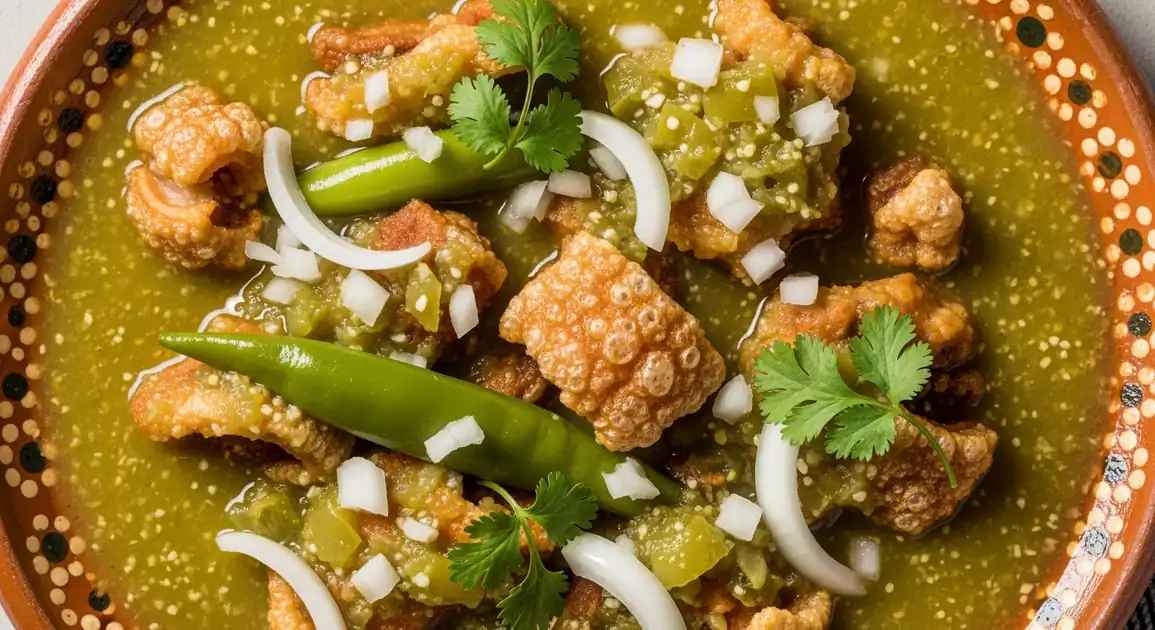Chicharrón en Salsa Verde
Chicharrón en Salsa Verde

Description
Mexico City offers some of the best iterations of Chicharrón en Salsa Verde, from market stalls to family restaurants. The capital's version tends to be moderately spicy and often incorporates additional ingredients like potatoes or nopales for a heartier meal. The dish is particularly popular for breakfast and lunch in traditional neighborhoods.
Dietary Information
Serving information
Serving style
In Mexico City, often served in ceramic plates or bowls with a generous stack of tortillas. Street vendors typically wrap tacos in paper. Garnishes are usually served on communal plates for self-service.
Quick facts
Markets and fondas typically serve from 7 AM - 5 PM. Some taquerías and restaurants may serve until 8 PM or later, especially in areas with nightlife.
Safety Tips
What to Look For
-
Actively simmering sauce
The salsa verde should be visibly hot and bubbling when served, which helps ensure food safety by maintaining proper temperature.
-
Fresh, vibrant green color
A bright green sauce indicates fresh ingredients and proper preparation. Avoid brownish or dull-colored salsas that may indicate oxidation or old ingredients.
-
Clean serving containers and utensils
Proper food handling is essential - look for vendors using clean ladles, serving in clean dishes, and maintaining a generally hygienic environment.
-
Freshly heated tortillas
Quality vendors serve warm, freshly heated tortillas, indicating attention to detail and freshness throughout their operation.
What to avoid
-
Room temperature or barely warm sauce
Lukewarm sauce may harbor bacteria - the dish should be served hot enough to be steaming.
-
Sauce with separated oil or watery consistency
This may indicate the sauce has been sitting too long or wasn't properly prepared.
-
Pre-portioned servings sitting unheated
The best versions are served directly from a simmering pot rather than pre-portioned and waiting.
-
Sour or fermented smell
The dish should smell fresh and herbal - any sour or off odors could indicate spoilage.
Price information
Price range
Budget tips
- Markets like Mercado de Jamaica or Mercado de la Merced offer excellent versions for 50-80 MXN.
- Many fondas include it in their 'comida corrida' (fixed menu lunch) for 80-120 MXN with rice, beans, and agua fresca.
- For budget options, look in working-class neighborhoods like Doctores or Portales rather than tourist areas.
- Street stalls often offer smaller portions as tacos (15-30 MXN each).
Value indicators
- Generous portion with good ratio of chicharrón to sauce.
- Handmade tortillas rather than commercial ones.
- Complementary sides (rice, beans, pickled vegetables).
- Freshness indicated by vibrant green color and proper temperature.
- Additional garnishes offered (diced onion, cilantro, lime).
Where to Find This Dish
Centro Histórico
Traditional eateries and market stalls in the historic center often serve excellent versions.
Mercado de San Juan, Mercado de la Merced, Small fondas near Zócalo
Morning, Lunchtime
Coyoacán
This historic neighborhood features several traditional restaurants serving authentic renditions.
Mercado de Coyoacán, Small restaurants around the main square
Late Morning, Afternoon
La Condesa/Roma
Trendy neighborhoods with both traditional fondas and upscale restaurants offering refined versions.
Mercado Medellín, Specialty Mexican restaurants
Brunch hours, Lunchtime
Vendor Tips
- In markets, look for stalls with 'Guisados' or 'Comida Casera' signs - they typically offer the best versions.
- Vendors with a variety of guisados (stewed dishes) usually make better quality food due to higher turnover.
- Some places offer it as part of a 'guisados' taco selection - a great way to try a smaller portion.
- Ask locals for recommendations - many have strong opinions about where to find the best version.
How to Order
Regional Variations
-
Chicharrón en Salsa Verde con Papas Estilo CDMX
(Chicharrón en Salsa Verde con Papas Estilo CDMX)
The Mexico City variation often includes diced potatoes, making it heartier and more filling for urban workers.
-
Chicharrón con Verdolagas en Salsa Verde
(Chicharrón con Verdolagas en Salsa Verde)
A seasonal Mexico City specialty incorporating purslane, particularly popular in spring and summer.
-
Tacos de Guisado de Chicharrón
(Tacos de Guisado de Chicharrón)
A Mexico City street food adaptation serving the dish as pre-made tacos from specialized guisado taco stands.
-
Chicharrón en Salsa Verde con Frijoles
(Chicharrón en Salsa Verde con Frijoles)
A heartier variation mixing or layering the dish with refried beans, popular in Mexico City fondas.
Cultural context
History
This dish exemplifies Mexican resourcefulness, originating as a way to use every part of the pig. While chicharrón (fried pork skin) has been consumed since colonial times, combining it with indigenous ingredients like tomatillos and chiles to create salsa verde represents the mestizo culinary tradition. The dish became particularly popular in central Mexico, including Mexico City, where it remains a staple in markets, street stalls, and home kitchens alike.
Local significance
In Mexico City, this dish represents the capital's mastery of traditional comfort foods and the city's historical connection to regional cuisines from across Mexico.
Eating customs
- Mexico City residents often add additional salsa, lime juice, and chopped onion to customize to their taste.
- Typically accompanied by agua fresca or café de olla rather than sodas in traditional establishments.
- In Mexico City, it's common to request 'un taco de chicharrón' directly from the cazuela (cooking pot) at market stalls.